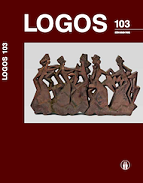Jean-Paul Sartre’o proza kaip filosofinės minties atspindys
Jean-Paul Sartre’s Prose as a Reflection of Philosophical Thought
Author(s): Gediminas MesonisSubject(s): French Literature, Existentialism
Published by: Visuomeninė organizacija »LOGOS«
Keywords: Jean Paul Sartre; literature; being; philosophy; subjectivity;
Summary/Abstract: The article draws conclusions based on an analysis of the most prominent of Sartre’s literary works such as: The Devil and the Good Lord (Le Diable et le Bon Dieu, 1951), No Exit (Huis clos, 1944), The Flies (Les mouches, 1943), Nausea (La nausée, 1938) and some others. It is observed that, by their behaviour, thoughts and aims, the characters of the literary works manifestly reflect the philosophy of existentialism. It is through their existential behaviour and existential thinking that these characters seek humanism. Seeking humanism, they protest against a society in which satisfying the human ego has become not just the routine of life, but also a goal. In literary writings by Sartre, one can gain an understanding that the possibility of making choices by the human being is the method that can lead towards humanism, which can serve as a foundation for building different society. Notably, the path towards this different society and this new society as an ideal find their reflection not in Sartre’s literary writings, but rather in his philosophical works: Existentialism Is a Humanism (L’existentialisme est un humanisme, 1946), Critique of Dialectical Reason (Critique de la raison dialectique I et II, 1960, 1985). The article puts forward the contention that pessimism over the existence of the human being that is evident in Sartre’s works of fiction does not seem so hopeless if this existence is contemplated against the background of his philosophical writings.
Journal: LOGOS - A Journal of Religion, Philosophy, Comparative Cultural Studies and Art
- Issue Year: 2020
- Issue No: 103
- Page Range: 100-107
- Page Count: 8
- Language: Lithuanian

